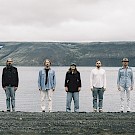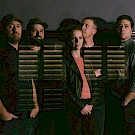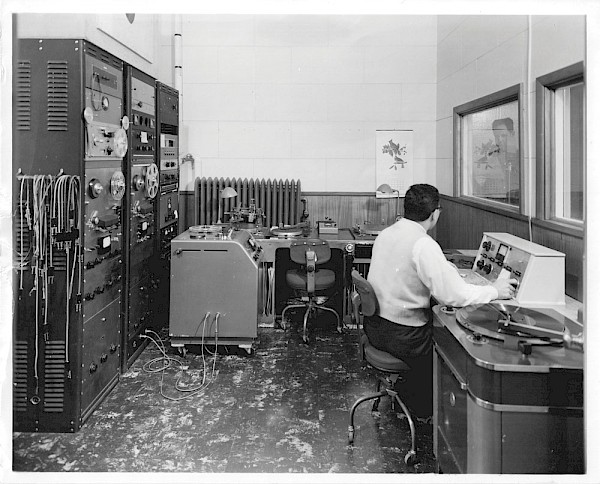 The control room of SW Portland’s Northwestern Incorporated, Motion Pictures and Recording, where The Kingsmen's legendary “Louie Louie” was recorded: Photo courtesy of the Robert M. Lindahl FamilyPortland is in flux. Blink once and your favorite local haunt is shuttering its windows. Twice, and there’s a new luxury high-rise on the corner. It’s obvious when all of this new development forces a longstanding venue out of business, but what about the less noticeable places where music is recorded?
The control room of SW Portland’s Northwestern Incorporated, Motion Pictures and Recording, where The Kingsmen's legendary “Louie Louie” was recorded: Photo courtesy of the Robert M. Lindahl FamilyPortland is in flux. Blink once and your favorite local haunt is shuttering its windows. Twice, and there’s a new luxury high-rise on the corner. It’s obvious when all of this new development forces a longstanding venue out of business, but what about the less noticeable places where music is recorded?
So Long City was longtime local musician Pat Kearns’ farewell to Portland. As frontman of Blue Skies For Black Hearts and owner of the now-shuttered PermaPress Recording, he left town last year due to construction of a six-story apartment building adjacent to his studio. It was simply untenable to record with heavy equipment operating in the vicinity.
“Running a recording studio is impossible while they work,” Kearns wrote in an email to fans in March 2017. “I can't survive the one to two years of time it will take them to complete the project.”
While Kearns landed in the Mojave Desert near Joshua Tree, Portland native Rob Stroup, another scene mainstay, saw rising costs—including property taxes and utilities that made it difficult to affordably price his services—and took to drier climes as well, leaving behind his 8 Ball Studio for Truth or Consequences, N.M. (Look for the desert destination Cosmic Turtle Sound Studios in the near future!) Yet, many studio bosses are attempting to stick it out amidst the changing city.
It’s no surprise that construction on SE Division has impacted Larry Crane’s storied Jackpot! Recording Studio, including reduced parking, more vehicle traffic and, most significantly, the creation of “undue noise and ground vibration that has almost stalled out work,” Crane says. There was no advance notification from the city or developers “regarding when or what would be happening directly across from our business,” and increased density could lead to more noise complaints, Crane notes.
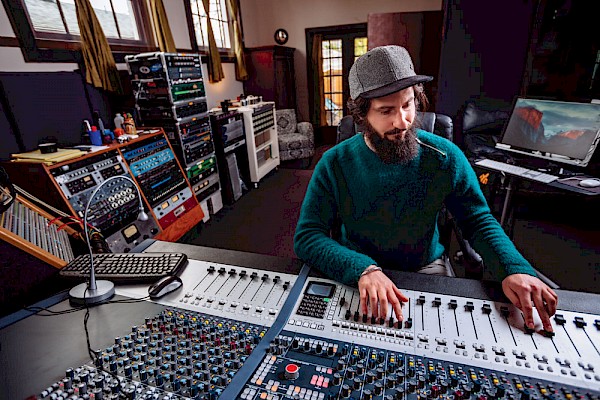 The Hallowed Halls' owner Greg Allen: Photo by Jason QuigleyDespite Portland’s shifting nature, one thing remains true: This is still a very much a music city. And that music, at some juncture, needs to be recorded.
The Hallowed Halls' owner Greg Allen: Photo by Jason QuigleyDespite Portland’s shifting nature, one thing remains true: This is still a very much a music city. And that music, at some juncture, needs to be recorded.
When it comes to recording studios, Portland has an embarrassment of riches, many of which are within the grasp (and budget) of even the most modest of indie artists. Some spaces, like Jackpot! and Flora Recording & Playback, consistently draw national talent, while others like The Hallowed Halls or The Map Room cater primarily to regional acts. Others, like The Rye Room, have carved out a niche producing specialized content—in this case, high-definition videos of live performances paired with studio-quality sound.
To say the least, we have options! An informal survey yields more than 75 studios in the metro area, and you can bet that for every one of those commercially advertised spaces, there are many other budget and basement studios flying under the radar.
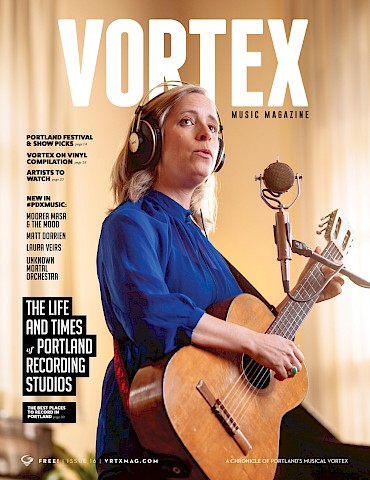 Explore the economics behind running a studio in a changing city while reading about notable spaces, producers and engineers who span all genres of the local scene in our Recording Issue.Recent advances in recording technology have made it more viable than ever to make a decent sounding record on a laptop at home, and it’s not uncommon for bands to record their first couple of releases themselves. But there are limitations to the DIY approach, and artists are likely to get better-sounding results quicker by recording in a proper studio where they have access to a well-tuned room, better isolation, accurate playback, and a higher caliber of microphones, preamps, EQs, compressors, and effects processors.
Explore the economics behind running a studio in a changing city while reading about notable spaces, producers and engineers who span all genres of the local scene in our Recording Issue.Recent advances in recording technology have made it more viable than ever to make a decent sounding record on a laptop at home, and it’s not uncommon for bands to record their first couple of releases themselves. But there are limitations to the DIY approach, and artists are likely to get better-sounding results quicker by recording in a proper studio where they have access to a well-tuned room, better isolation, accurate playback, and a higher caliber of microphones, preamps, EQs, compressors, and effects processors.
Most importantly, commercial studios provide access to knowledgeable audio engineers and producers who can apply a wealth of recording techniques—such as microphone selection and placement—to shape the sound, contribute to the creative process, troubleshoot problems, and ultimately help artists achieve their vision. An experienced engineer can make a great sounding record on budget gear. Conversely, an inexperienced recordist can make even the most expensive microphones sound subpar if he or she doesn’t know exactly where to point them.
Keeping a studio afloat is no easy feat, as overheads tend to be high and most are booked out only a month or two in advance. Others, despite their success, have fallen prey to Portland’s changing landscape. Producer Jeff Bond has had to move his operation several times in recent years due to changing leases and untenable rents. Similarly, Sean Flora’s successful Rock n Roll BnB on Sauvie Island had to shut down when the property was sold. Some producers, like Bond, John Askew and David Streit, opt to track their clients’ records in an established commercial studio, then take them home to their smaller production studios for mixing.

